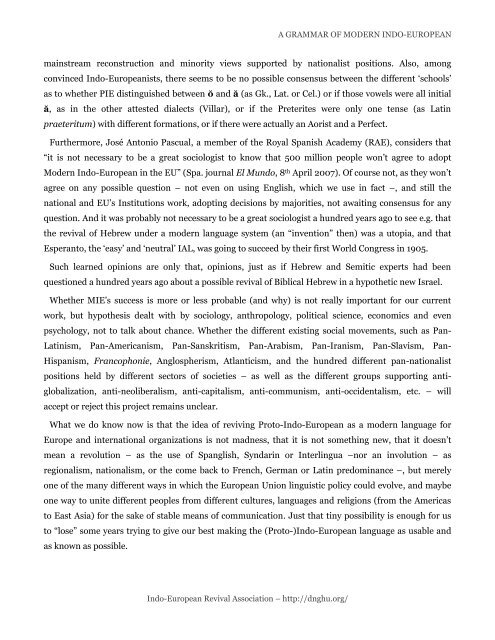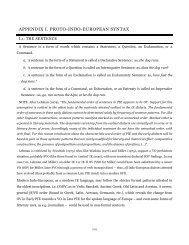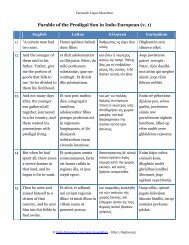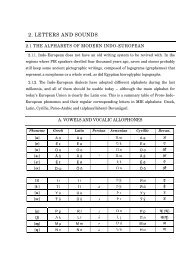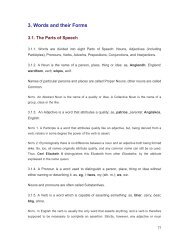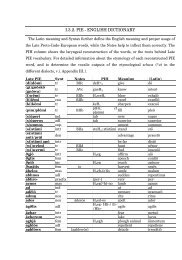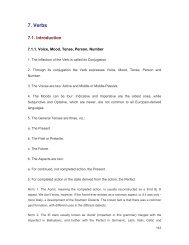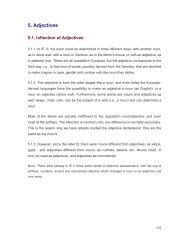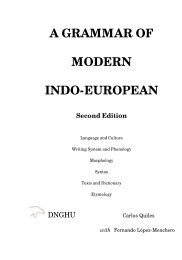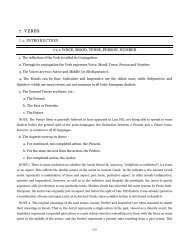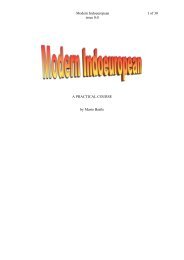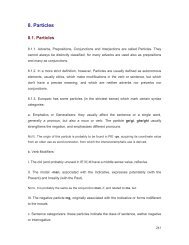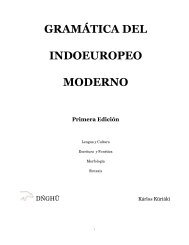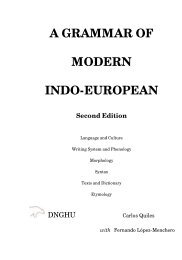Create successful ePaper yourself
Turn your PDF publications into a flip-book with our unique Google optimized e-Paper software.
Indo-European Revival Association – http://dnghu.org/<br />
A <strong>GRAMMAR</strong> <strong>OF</strong> <strong>MODERN</strong> <strong>INDO</strong>-<strong>EUROPEAN</strong><br />
mainstream reconstruction and minority views supported by nationalist positions. Also, among<br />
convinced Indo-Europeanists, there seems to be no possible consensus between the different ‗schools‘<br />
as to whether PIE distinguished between ŏ and ă (as Gk., Lat. or Cel.) or if those vowels were all initial<br />
ă, as in the other attested dialects (Villar), or if the Preterites were only one tense (as Latin<br />
praeteritum) with different formations, or if there were actually an Aorist and a Perfect.<br />
Furthermore, José Antonio Pascual, a member of the Royal Spanish Academy (RAE), considers that<br />
―it is not necessary to be a great sociologist to know that 500 million people won‘t agree to adopt<br />
Modern Indo-European in the EU‖ (Spa. journal El Mundo, 8 th April 2007). Of course not, as they won‘t<br />
agree on any possible question – not even on using English, which we use in fact –, and still the<br />
national and EU‘s Institutions work, adopting decisions by majorities, not awaiting consensus for any<br />
question. And it was probably not necessary to be a great sociologist a hundred years ago to see e.g. that<br />
the revival of Hebrew under a modern language system (an ―invention‖ then) was a utopia, and that<br />
Esperanto, the ‗easy‘ and ‗neutral‘ IAL, was going to succeed by their first World Congress in 1905.<br />
Such learned opinions are only that, opinions, just as if Hebrew and Semitic experts had been<br />
questioned a hundred years ago about a possible revival of Biblical Hebrew in a hypothetic new Israel.<br />
Whether MIE‘s success is more or less probable (and why) is not really important for our current<br />
work, but hypothesis dealt with by sociology, anthropology, political science, economics and even<br />
psychology, not to talk about chance. Whether the different existing social movements, such as Pan-<br />
Latinism, Pan-Americanism, Pan-Sanskritism, Pan-Arabism, Pan-Iranism, Pan-Slavism, Pan-<br />
Hispanism, Francophonie, Anglospherism, Atlanticism, and the hundred different pan-nationalist<br />
positions held by different sectors of societies – as well as the different groups supporting anti-<br />
globalization, anti-neoliberalism, anti-capitalism, anti-communism, anti-occidentalism, etc. – will<br />
accept or reject this project remains unclear.<br />
What we do know now is that the idea of reviving Proto-Indo-European as a modern language for<br />
Europe and international organizations is not madness, that it is not something new, that it doesn‘t<br />
mean a revolution – as the use of Spanglish, Syndarin or Interlingua –nor an involution – as<br />
regionalism, nationalism, or the come back to French, German or Latin predominance –, but merely<br />
one of the many different ways in which the European Union linguistic policy could evolve, and maybe<br />
one way to unite different peoples from different cultures, languages and religions (from the Americas<br />
to East Asia) for the sake of stable means of communication. Just that tiny possibility is enough for us<br />
to ―lose‖ some years trying to give our best making the (Proto-)Indo-European language as usable and<br />
as known as possible.


